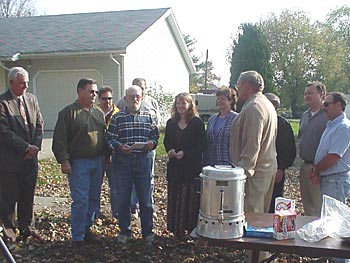|
A
Peek inside a hotly-debated issue
District
27 opens the doors of Central School and LJHS for public tours
[NOV.
4, 2000]
I went on a tour of Central
School and LJHS last night as a purely curious newcomer to Lincoln. I left as an
alarmed citizen.
|
|
I too attended a grade school and
high school that looked very much like Lincoln's two schools on the outside. And
from the outside, both schools look reasonably sound. But when I ventured
through the door, it was easy for me to understand why something must be done.
Those in my tour group came to
the special open house for various reasons. Some to reminisce about their days
at Central School or the old high school, others to show their children who
attend other area schools just how lucky they are.
Mrs. Jody Borberly led our group
first out to a boiler room built three years after the Civil War that housed a
boiler installed four years prior to the start of WWII. According to Mrs.
Borberly, each time that workers come to do repair on the boiler they fear they
will run into something that cannot be repaired. In its current state, the
boiler is leaving some classrooms out in the cold while others are steaming hot.
The registers in each room can be very dangerous for small hands and are very
noisy.

On the way up to the third floor
I noticed how bowed the steps had become and wondered how many people had taken
some serious spills as they ran up and down the staircase. Our group soon found
that the pine hardwood classroom floors were seriously warped as well. So much
so that a golf ball sent rolling across the room would snake in twenty
directions before it found the lowest point. Teachers adjust to the uneven
floors by placing shims under heavy bookcases and desks.
Over the years, there have been a
lot of stop-gap measures taken at Central School - suspended ceilings to cover
up the falling plaster and termite damage, radon pumps in the cafeteria and
kindergarten rooms, partial walls blocking ends of hallways to make more
classrooms.

It quickly become obvious to me
that Central School's problem was not only its dilapidated condition, but also
rather the lack of space available for all the new programs that must now be
offered by a school. The counselor's "office" is actually at the end
of a busy 3rd floor hall. The need for ready access to the fire escape prevents
the construction of some kind of dividing wall. So, Central School students who
reveal their problems to a counselor do so at the risk of revealing themselves
to anyone walking down echoing halls.
Students who get sick while at
school must do so in the dark hall between the school secretary, the principal
and Mrs. Ellen Dobihal's first grade classroom.
[to top of second column in this
article]
|

Things are dark everywhere in
Central School. This is especially true in the kindergartner's bathroom where
little kids must use completely unlit and cramped stalls. "You know good
and well that the two prisons in town have better bathrooms than this,"
remarked fellow tour member Debbie Kastendick.
Kastendick expressed similar
feelings about the gym where students eat their lunch. "This place looks
like a prison, except these conditions would never be allowed there because it
would be a violation of prisoner's rights."
Teachers have learned to cope
despite all the challenges, doing their best to keep the rooms cheery and happy.
But a sagging structure, outdated electrical systems, extreme fluctuations in
temperature, mold on the walls and asbestos on the pipes all make educating the
future leaders of Lincoln a great challenge.

Although appearing a bit sturdier
than Central School, the Lincoln Junior High School building also presents some
challenges to educators.
Imagine trying to maintain
security in a building with a maze of little makeshift rooms and dark spaces
under stairwells where students and others could easily escape attention.
Split-level foyers make it virtually impossible for the office to monitor who is
coming in and out of the building.
"It's terribly run
down," says Norma Schroeder who attended high school in the building and
graduated in 1945. "It just doesn't seem as clean as it needs to be."

The faculty and student body has
done what they can to spruce up the halls and classrooms, adding bright colors
of paint and posters to the walls. Despite their best efforts, students still
eat their lunch in a tiny cafeteria that resembles a bomb shelter, and they
dress for gym in dimly-lit cave-like locker rooms.
There are some very nice old
features in the building that could, and should be preserved. The classic wood
framed blackboards and bulliten boards, along with some built-in cabinets in the
former home-economics classrooms could provide lots of wonderful character to an
updated middle school building.
Thank you District 27 for opening
your doors to let the public better understand what challenges you must deal
with each and every day.
[Marty
Ahrends]
|
|
Lincoln
Ag Center
1441 State
Route 10 East
Lincoln, IL
217-732-7948 We
support Lincolndailynews.com! Click
here to visit our website!!! |
Blue
Dog Inn
111 S. Sangamon
217-735-1743
Open
for Lunch Mon.-Sat.
Open for Dinner Tues.-Sat.
Click
here to view our
menu and gift items |
25
Cents per
Gallon
Self-vendored
reverse osmosis water The
Culligan
Fresh Water Station 318
N. Chicago St., Lincoln |
|
|
|
Voters:
Are you
ready? Have you decided?
School tours
available
[NOV.
3, 2000]
This
coming Tuesday, Nov. 7, Lincoln voters will be given the opportunity
to affirm or negate the District 27 school board’s proposal to
pursue building two new schools. The proposal on the ballot is as follows:
|
Lincoln
Elementary School District Number 27
Proposition
to issue $4,100,000 School Building Bonds
Shall
the Board of Education of Lincoln Elementary School District Number
27, Logan County, Illinois, build and equip two (2) new school
buildings and improve the site thereof and demolish the Lincoln
Junior High School building and the Central Elementary School
building and issue bonds of said school district to the amount of
$4,100,000 for said purposes?
YES
(Punch
165)
NO
(Punch
166)
|
The
public is invited for a close-up inspection of the schools this
evening. Teachers and administration will be leading tours of
Central and Lincoln Junior High School from 4 to 6 p.m. today.
|
|
Habitat
continues work at 316 Sherman St.
 [NOV.
2, 2000]
With
much of the exterior completed, work continues on the inside of the
current Logan County Habitat for Humanity construction site. Most
work takes place on Mondays and Saturdays. Anyone with a desire to
assist should just show up any time after 8 a.m. either of these
days. The goal for this site remains Christmas. There’s lots to do
if the family to receive this house is going to be able to celebrate
Christmas in it. This is an opportunity for you and your business,
friends or group to express the spirit of the holidays to our fellow
man. [NOV.
2, 2000]
With
much of the exterior completed, work continues on the inside of the
current Logan County Habitat for Humanity construction site. Most
work takes place on Mondays and Saturdays. Anyone with a desire to
assist should just show up any time after 8 a.m. either of these
days. The goal for this site remains Christmas. There’s lots to do
if the family to receive this house is going to be able to celebrate
Christmas in it. This is an opportunity for you and your business,
friends or group to express the spirit of the holidays to our fellow
man.
|
|
|
Part
2
Presentation at Oasis aims to help people understand Medicare
[NOV.
2, 2000]
On
Tuesday, Joni Castleman, coordinator for Services in the Neighborhood for
Seniors (SINS), visited Lincoln’s Oasis Center to explain Medicare 2000 and
answer questions. This was the last in a series of three informational sessions
presented at the Oasis.
|
|
[click here for
Part 1]
After
explaining Medicare services and requirements, Castleman went on to discuss
filing for benefits. One question is very crucial when discussing filing for
benefits: Does the doctor accept assignment? A doctor who accepts
assignment agrees to charge only what Medicare considers a reasonable price.
This doctor will file a claim directly with Medicare — usually without
charging the patient that day. The cost will not be more than Medicare allows.
Once an individual pays the $100 deductible, Medicare will pay 80 percent of the
bill, and the patient pays 20 percent. Ninety percent of the doctors in Illinois
accept assignment. If a doctor does not accept assignment, ask about making an
exception. Doctors are allowed to accept assignment on an individual basis.
Doctors
who do not accept assignment, or Medicare’s set price, may charge a patient 15
percent more than Medicare’s accepted price, thanks to legislation in 1992.
Before that, doctors could charge any amount they chose. Doctors who do not
accept assignment are still obligated to file patients’ claims, although the
doctor’s office will probably ask for the payment that day. In this case
Medicare reimburses the patient.

Some
seniors complain that Medicare does not reimburse them quickly enough. Medicare
disperses a refund within 31 days of receiving the claim, but a doctor’s
office may wait up to 12 months to file the claim.

[to top of second column in this
section]
|

Castleman
had some good news about the "Explanation of Benefits" sheets that
people receive after every doctor visit or procedure. In August, Medicare began
sending out monthly "Summary Notices" of this information, to reduce
paperwork. So those medical bill files that patients keep should not be as thick
as before.
At
the end of the presentation, Castleman handed out a "Medication
Profile" and "Medicare Claims Ledger." These are two ways to
summarize your medicines and bills. She reiterated what Jim White urged last
week: Keep an accurate list of all your medicines. Include prescription drugs,
regularly taken over-the-counter drugs — such as aspirin — and herbal
products. She said that EMTs are trained to look for such lists posted on the
refrigerator or other conspicuous places so that they know what you are taking.
This can drastically influence the medical treatment you should receive.
A
member of the audience advised that individuals get all their prescriptions from
the same pharmacist so that the pharmacist can double-check the possible
reactions between prescribed, over-the-counter and herbal medicines.

If you have
questions about Medicare or need help with your medical paperwork, call Joni
Castleman or another representative at SINS: 217-726-3761 or 1-800-621-7584. If
you want to know if a doctor accepts assignment, just ask the doctor’s office
or call Medicare Claims Part B at 1-800-642-6930.

[Jean
Ann Carnley]
|
|
|
Habitat
house site dedicated in Mount Pulaski
[NOV.
1, 2000]
Mount
Pulaski city officials and Logan County Habitat for Humanity board
members gathered this lovely Nov. 1 morning at 317 S. Vine St. in
Mount Pulaski for a short dedication ceremony. The site is the first
that will be developed outside of Lincoln by the local Habitat
chapter. The group will also reach outside Lincoln for the tentative
next site. It is planned for Atlanta.

Present
for this morning’s dedication were Mount Pulaski city officials
John Bates (mayor), Marla Durst (city clerk), Mike Patridge (public
works director) and Lyle Fout (code enforcement official); Mount
Pulaski aldermen John Poffenbarger, Rhonda Mattern, Dennis Clemmons
and Bill Glaze; and Logan County Habitat for Humanity board members
George Dahmm, Bill Sahs and Phil Dehner. Not present was Jim Coogan
of Coogan's Excavating, who voluntarily cleared the site.
|
|
|
Part
1
Presentation at Oasis aims to help people understand Medicare
[NOV.
1, 2000]
On
Tuesday, Joni Castleman, coordinator for Services in the Neighborhood for
Seniors (SINS), visited Lincoln’s Oasis Center to explain Medicare 2000 and
answer questions. This was the last in a series of three informational sessions
presented at the Oasis.
|
|

SINS
is a branch of Blue Cross Blue Shield of Illinois. SINS does not sell any
products but helps individuals understand the paperwork and bills generated from
doctor’s offices, hospitals, Medicare and secondary insurance providers.
Representatives of SINS do not claim to have a complete knowledge of every
insurance company’s system, but because they see so many different forms and
bills, they are well practiced at deciphering seemingly illegible forms.

Castleman
travels around 40 counties to do presentations similar to the one she did at
Lincoln’s Oasis Center. Her goal is to help seniors better understand their
Medicare and secondary insurance coverage. She has a booklet,
"Understanding Medicare 2000," which simplifies the whole process.
The
first part of Castleman’s talk concerned Part A of Medicare, which only covers
hospital visits and skilled nursing care. If an individual has worked 10 years,
cumulative, the Medicare A premium is waived, because the person has already
paid. For those who have not worked, the premium is $301 per month. If someone
has worked between one and 10 years, the premium is prorated. The deductible for
each illness is $776, provided that the person recovers in 60 days. Next year
the deductible will increase by $16 to $792. Medicare A does not pay for private
hospital rooms unless the doctor orders one, although a person may choose to
have a private room and pay the difference.

In
addition to hospital rooms, Part A also pays for skilled nursing care that
follows a three-day hospital stay. Skilled nursing care facilities are different
from nursing homes, because these facilities do not have custodial care — that
is, bathing and feeding. Skilled nursing care may be given in a rehab center or
in one’s home. Medicare pays for skilled nursing care because it focuses on
short-term rehabilitation or healing. There are a lot of guidelines surrounding
skilled nursing care under Medicare A, so it is good to talk to someone like
Joni Castleman who can explain the proper procedures.
[to top of second column in this
section]
|

In
transition to the next topic of discussion, Castleman said that people rarely
have problems with Medicare A, especially when compared to Medicare B. Medicare
B is more confusing than Medicare A because it covers so many different
services. The premium for Part B, if a person accepts coverage at age 65, is
$45.50 a month. Next year that amount will increase by $4.50 to $50. If people
wait to add Medicare B to their Medicare A coverage, the premium for Part B will
increase by 10 percent every year that they wait. Unlike Medicare A’s $776
deductible (possibly every two months), Medicare B has an annual deductible of
only $100, and it is not expected to increase in the year 2001. Once this
deductible is met, Medicare pays 80 percent of all approved expenses.

Medicare B
covers doctor’s care, surgery, outpatient care, lab tests, x-rays, home
healthcare, durable medical equipment, other medically necessary services and
supplies, and some preventative tests and shots. Part B does not cover dental
exams, hearing aids, eyewear, eye exams, prescription drugs, hearing tests and
routine physicals. Although Medicare B covers preventative screenings and tests,
be extra careful when scheduling appointments. Some annual exams are only
covered if the tests are a year and a day apart. If the tests are exactly a year
apart, the individual will be charged for the second test. Medicare will pay for
more frequent screenings only if a doctor prescribes them.
(To be
continued)
[Jean
Ann Carnley]
[click here for
Part 2]
|
|
Lincolndailynews.com is
the place to advertise
Call (217) 732-7443
or e-mail
ads@lincolndailynews.com
|
ABE
LINCOLN
PHARMACY
Just
inside the ALMH front door
Jim
White, R.Ph.
"We
Answer Your Medication Questions."
Click
here to visit our website |
Tell
a friend
about
Lincoln Daily
News.com |
|
|
|
Announcements
|
|
Logan
County voting places for Nov. 7 election
[click
here for listing]
|
|
|
Notice
of Open Burn Code released
by Fire Department
Open Burning
code for the City of Lincoln
BOCA National
Fire Prevention Code 1996 Chapter 4 City Code Book Fire Regulations Chapter 3
BOCA
F-403.4.3 OPEN
BURNING PROHIBITED: The code official shall prohibit open burning that will
be offensive or objectionable due to smoke or odor emissions when atmospheric
conditions or local circumstances make such fires hazardous. The code official
shall order the extinguishments, by the land owner or the fire department, of
any open burning that creates or adds to a hazardous or objectionable situation.
F-403.5
LOCATION OF OPEN BURNING: Shall not be less than 50 feet from any structure.
F-403.7
ATTENDANCE: Any open burning shall be constantly attended until the fire is
extinguished. A water supply such as buckets of water or a connected and charged
garden hose shall be available for immediate utilization.
CITY CODE BOOK
Chapter 3 Fire regulations
5-3-2 FIRE ON
PAVEMENTS: Fires are not allowed on blacktop streets, alleys or concrete
sidewalks ($25 fine)
5-3-4 BURNING
IN THE CITY: E-1 recreational fires shall contact the Lincoln Fire
Department and notify them of the date and time of the wiener roast. No garbage
shall be burned and burning must be consistent with other laws.
E-2: From
October 2 through May 31 between 7:00 A.M . and 5: 00 P.M. residents are
allowed to burn landscape waste only. (Leaves, trees, tree trimmings, branches,
stumps, brush, weeds, grass, grass and yard trimmings only)
Fines for
violations of the following codes are a minimum of $15 issued by fire crews
handling complaints and illegal fires.
Persons
complaining about fires must sign a complaint with the Fire Department before
extinguishments of legal fires is carried out. No fines will be issued to
persons burning with in the boundaries of the code. The persons burning will be
advised of the signed complaint and asked to extinguish the fire or the Fire
Department will extinguish the fire.
|
|
Lincoln
Ag Center
1441 State
Route 10 East
Lincoln, IL
217-732-7948
We
support Lincolndailynews.com!
Click
here to visit our website!!! |
Blue
Dog Inn
111 S. Sangamon
217-735-1743
Open
for Lunch Mon.-Sat.
Open for Dinner Tues.-Sat.
Click
here to view our
menu and gift items |
25
Cents per
Gallon
Self-vendored
reverse osmosis water
The
Culligan
Fresh Water Station
318
N. Chicago St., Lincoln |
|
|
|
Landfill
to be open extended hours for leaf disposal
[OCT.
11, 2000]
Beginning
Monday, Oct. 16, the Lincoln City Landfill will be open extended hours to allow
residents to dispose of leaves and yard waste, according to Donnie Osborne,
street superintendent. The landfill will open at 8 a.m. and remain open until 4
p.m. seven days a week, probably until mid-December, he said. Residents may
bring in leaves any way they like —
in bags, boxes or pickup trucks —
but they must take the leaves out of the containers and take the containers back
home with them.
|
|
|
Public
notice
Filing dates for
nomination petitions for city offices
[OCT.
10, 2000]
The
office of the city clerk in Lincoln will be open for filing petitions for
nomination for the Feb. 27, 2001, consolidated primary election, with petitions
accepted from 9 a.m. to 5 p.m. on the following dates: Dec. 11, 12, 13, 14, 15
and 18.
 Petitions
will be accepted for the following city offices: Petitions
will be accepted for the following city offices:
- Mayor
- City treasurer
- City clerk
- Alderman Ward 1
- Alderman Ward 2
- Alderman Ward 3
- Alderman Ward 4
-
Alderman
Ward 5
No
petitions will be accepted before 9 a.m. or after 5 p.m.
[Juanita
Josserand, city clerk]
|
|
|
Notice
to absentee voters
[OCT.
9, 2000]
Registered
voters expecting to be absent from the county on the Nov. 7 election day may
vote in person at the Logan County Clerk’s Office, second floor, Courthouse,
Room 20, Lincoln, from now until Nov. 6.
Registered
voters expecting to be absent from the county on election day or those who are
permanently disabled or incapacitated may now make application by mail to vote
absentee. Applications will be received by the county clerk until Nov. 2. No
ballots will be sent by mail after Nov. 2, as provided by law.
Sally
J. Litterly
Logan
County Clerk
Election
Authority
|
|
Back
to top
|
Top
Stories | Sports
News | Sports
Talk | Area
Athletes in Action | Out
and About | TechLine
| Weather
| Elsewhere
A
Day in the Life... | Milestones
| Obituaries
| Diaspora
Business
& Ag | Organizations
| Events
| Good
Neighbors | Honors
& Awards
Ombudsman
| Law
& Courts | Rural
Review
Crosswords
| Games
The
Arts | Home
and Family | Spiritual
Life | Health
& Fitness | Teaching
& Learning | Book
Look | Movies
& Videos
Still
Waters | The
Hallway Buzz | What's
Up With That? | Where
They Stand | the
em space
How
We Stack Up | By
the Numbers
Letters
to the Editor | About
LDN | Corrections
| Happy
Ads | Quick
Coupon Clip-Outs
|
|

